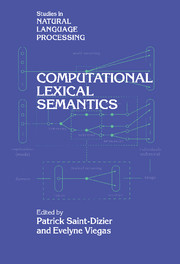Book contents
- Frontmatter
- Contents
- List of contributors
- Preface
- 1 An introduction to lexical semantics from a linguistic and a psycholinguistic perspective
- Part I Psycholinguistics for lexical semantics
- Part II Foundational issues in lexical semantics
- Part III Lexical databases
- Part IV Lexical semantics and artificial intelligence
- Part V Applications
- Part VI Computer models for lexical semantics
- Author index
- Subject index
Preface
Published online by Cambridge University Press: 29 September 2009
- Frontmatter
- Contents
- List of contributors
- Preface
- 1 An introduction to lexical semantics from a linguistic and a psycholinguistic perspective
- Part I Psycholinguistics for lexical semantics
- Part II Foundational issues in lexical semantics
- Part III Lexical databases
- Part IV Lexical semantics and artificial intelligence
- Part V Applications
- Part VI Computer models for lexical semantics
- Author index
- Subject index
Summary
This volume on computational lexical semantics emerged from a workshop on lexical semantics issues organized in Toulouse, France, in January 1992. The chapters presented here are extended versions of the original texts.
Lexical semantics is now becoming a major research area in computational linguistics and it is playing more of a central role in various types of applications involving natural language parsers as well as generators.
Lexical semantics covers a wide spectrum of problematics from different disciplines, from psycholinguistics to knowledge representation and to computer architecture, which makes this field relatively difficult to perceive as a whole. The goal of this volume is to present the state of the art in lexical semantics from a computational linguistics point of view and from a range of perspectives: psycholinguistics, linguistics (formal and applied), computational linguistics, and application development. The following points are particularly developed in this volume:
psycholinguistics: mental lexicons, access to lexical items, form of lexical items, links between concepts and words, and lexicalizing operations;
linguistics and formal aspects of lexical semantics: lexical semantics relations, prototypes, conceptual representations, event structure, argument structure, and lexical redundancy;
knowledge representation: systems of rules, treatment of type coercion, aspects of inheritance, and relations between linguistics and world knowledge;
applications: creation and maintenance of large-size lexicons, the role of the lexicon in parsing and generation, lexical knowledge bases, and acquisition of lexical data;
operational aspects: processing models and architecture of lexical systems.
- Type
- Chapter
- Information
- Computational Lexical Semantics , pp. ix - xPublisher: Cambridge University PressPrint publication year: 1995

